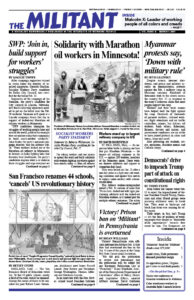March 4, 1996
The grim consequences of the rail bosses’ drive to increase productivity and profits through “cost cutting” measures have been driven home with deadly force this month. Eighteen people have been killed in rail accidents in 21 days.
But the causes of these deadly accidents lie not with errors by workers, signal failures, or faulty safety equipment. They are the inevitable results of the drive by the rail bosses, with the aid of the government, to increase profits. In the last decade train crews have been cut from an average of five to three, and sometimes two.
By leading a fight to protect the lives of rail workers, community residents, and passengers, and to protect the environment, rail workers can win wide support in their battle against the bosses, who put a price tag on people’s lives.
March 5, 1971
DETROIT — The few hundred Vietnam veterans who attended the Winter Soldier Investigations here Jan. 31-Feb. 2 came from all parts of the country to testify about their experiences in Vietnam, the daily atrocities and the effects of the war on themselves.
Jamie Henry was against the war when he was drafted. Today, because of what he saw, he is more active in the antiwar movement than ever.
Another veteran, Bob Walker, joined at the age of 17 and was levied to Vietnam in 1969 as a combat engineer. Like most GIs he was indoctrinated with the idea that the Vietnamese were inferior.
Then one day he talked to a 15-year-old Vietnamese who spoke English and realized that the Vietnamese were just as human as he was. After that, he could no longer accept what the U.S. was doing there and he began to oppose the war.
March 2, 1946
A fiery slogan is sweeping India. “Long Live the Revolution!” The people themselves have thus placed the label of “revolution” on the staggering blows they dealt imperialist Britain’s despotic colonial rule during the past week. Their battle for India’s independence is shaking the British Empire to its foundations.
Uprisings are occurring in all India’s major cities. The workers are moving to the forefront in the unfolding crisis.
[In] Bombay the British rulers confined members of the Indian Royal Navy to Castle Barracks to prevent them from joining civilian demonstrators. When the men responded with a strike, the British posted armed guards. The besieged naval strikers tried to get out into the streets. When they were threatened by the British with violence, other members of the Navy maneuvered nine warships into battle position.

